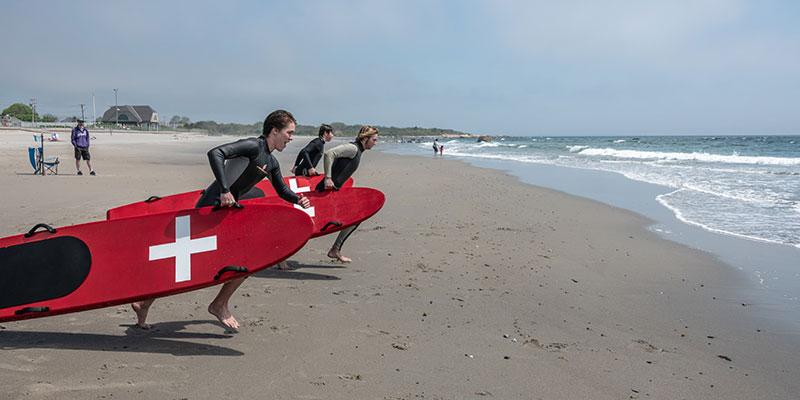As the end of this year's General Assembly nears, local legislators push to get bills passed
Senate OKs Gu bill protecting parking at shore access
points
The Senate approved legislation
sponsored by Sen. Victoria Gu to protect the public’s access to the shore by
establishing requirements that must be followed before parking can be reduced
or restricted near any Coastal Resources Management Council designated right of
way.
The bill is part of a package of bills sponsored in the Senate by Senator Gu
(D-Dist. 38, Westerly, Charlestown, South Kingstown) and in the House by Rep.
Terri Cortvriend (D-Dist. 72, Portsmouth, Middletown) to protect public
shoreline access.
The bill (2025-S 0716aa) would set requirements that municipalities,
private agencies and other organizations would have to follow before they could
reduce or restrict parking near designated CRMC rights of way. These
requirements would include submitting a comprehensive parking plan, analyzing
the impact on accessibility under the Americans with Disabilities Act and
conducting a public comment period of at least 30 days. It would also allow the
CRMC and DEM to enforce these requirements and impose fines and penalties if
they are violated. Any fines and penalties would go into a newly created Rhode
Island Shoreline Access Improvement Fund, a restricted receipt account that
will be used to support projects enhancing public access to the shoreline.
The bill now goes to the House, where Representative
Cortvriend is sponsoring its companion (2025-H 6093).
“Sometimes, local governments — often pressured by nearby
property owners — will remove or reduce public parking near beach access
points. This makes it harder for the public to visit, since fewer people will
come if they can’t park nearby. This legislation provides guardrails and a
public, transparent process if there is any effort to reduce or restrict the
parking available near a CRMC-designated right of way to the shore,” said
Senator Gu.
In recent years changes to parking near public rights of
way have drawn complaints from members of the public who
say that they serve to restrict public access to only those who already live on
the waterfront.
House approves Fogarty bill that would allow driver
education in an instructor-led virtual format
The House of Representatives passed
legislation introduced by Rep. Kathleen A. Fogarty (D-Dist. 35, South
Kingstown) that would allow virtual driver education classes.
The bill (2025-H 5731A) would permit instructor-led virtual
instruction for driver education until July 1, 2027, and calls for an
evaluation of the program.
“Not everyone has access to driver’s education classrooms,
and many students prefer virtual learning, particularly those with physical or
learning challenges,” said Representative Fogarty. “It also provides an
alternative for families whose parents may not be able to take the time off to
bring their children to driving instruction in traditional classrooms.”
Mary Maguire, vice president of public and government
affairs for AAA Northeast, testified in favor of the bill, telling the House
Committee on State Government and Elections, “During the pandemic, students
could only take driver education virtually, and the format proved to be very
effective. During the pandemic, we taught almost 100 virtual classes to more
than 2,300 Rhode Island students. We found that our virtually trained students’
average test scores were almost identical to what they were before COVID.”
Under the terms of the legislation, the Board of Education
would be required to provide a report comparing test scores of virtual versus
in-person instruction to the speaker of the House and president of the Senate
no later than Sept. 1, 2027.
The measure now moves to the Senate where similar
legislation (2025-S 0832) has been introduced by Sen. Louis P. DiPalma
(D-Dist. 12, Middletown, Newport, Tiverton, Little Compton).
Senate approves Sosnowski legislation creating license to
harvest invasive green crabs
 |
| Schoodic Institute/Suzannah Buzzell |
The Senate approved legislation
introduced by Sen. V. Susan Sosnowski (D-Dist. 37, South Kingstown) that would
create a license for the harvesting of green crabs.
The European green crab is an invasive species in Rhode
Island’s coastal waters. Like many invasive species, the green crab poses a
threat to the ecosystem and is particularly harmful for shellfish and eelgrass
habitats, which serve as nurseries for native marine species.
The bill (2025-S 0938A) would authorize the Department of
Environmental Management to offer commercial licenses for the taking of green
crabs subject to a fee of $10.
“Not only are green crabs an invasive species, they are also
a high-protein food source,” said Senator Sosnowski, who chairs the Senate
Committee on Environment and Agriculture. “Under current state law, they can
only be caught with a $200 non-lobster crustacean endorsement add-on to
the DEM marine license. A $10 license exclusively for green crabs would greatly
increase access to the harvesting of a species that is endangering native sea
life, including quahogs and blue crabs.”
The measure now moves to the House of Representatives where
similar legislation (2025-H 6157) has been introduced by Rep. Kathleen A.
Fogarty (D-Dist. 35, South Kingstown).
Senate approves Sosnowski bid to make clean air, soil and
climate a state constitutional right
The Senate approved a resolution
introduced by Sen. V. Susan Sosnowski (D-Dist. 37, South Kingstown) that seeks
to add a Green Amendment to the state constitution.
The resolution (2025-S 0327) would ask the state’s voters to amend Article
I of the state constitution to provide all people in the state with an
inherent, inalienable, indefeasible and self-executing right to clean air,
health and uncontaminated soil, a life supporting climate and the preservation
of the environment’s natural, scenic and recreational values.
“When it comes to protecting the environment, Rhode Island
has always been a leader, and I’m proud that the General Assembly has
prioritized protecting the vast natural resources of our small state,” said
Senator Sosnowski, who chairs the Senate Committee on Environment and
Agriculture. “This would ask Rhode Island voters to forever enshrine in our
constitution the protection of these resources for present and future
generations.”
If enacted, Rhode Island would join Montana, Pennsylvania
and New York in preserving environmental rights in its constitution.
The measure, which would be placed on the ballot at the next
statewide general election, now moves to the House of Representatives where
similar legislation (2025-H 5732) has been introduced by Rep. David A.
Bennett (D-Dist. 20, Warwick, Cranston), who chairs the House Committee on
Environment and Natural Resources.
Senate passes DiMario’s textile recycling bill
The Senate approved legislation sponsored by Sen. Alana M.
DiMario (D-Dist. 36, Narragansett, North Kingstown, New Shoreham) that would
create a public outreach campaign about textile recycling.
“This legislation is needed because most of the public does not realize that
textiles can be recycled and that recycled textiles are a valuable
commodity. And by increasing the practice of textile recycling, we will
also be able to extend the life of the state’s landfill, which is rapidly
approaching its capacity. At a time when we are striving to create a more
sustainable way of life, this bill will move us closer to that goal,” said
Senator DiMario.
According to the most recent data, an estimated 28,860 tons of textiles from
residential, industrial and commercial institutions were delivered to the
landfill per year, and the state’s only landfill will reach its capacity by
2046.
The legislation (2025-S 0324) would create a public education outreach
program to educate residential households and commercial businesses on the
value of, and proper methods to, recycle textiles in the state. The bill
also contains a reporting and accountability requirement to measure if the
outreach and education program is effective in helping individuals, businesses,
and municipalities increase their textile recycling rates and divert textiles
from the landfill.
It was developed with input from the Department of Environmental Management,
the Rhode Island Resource Recovery Corporation, the League of Cities and Towns,
and Big Brothers Big Sisters of Rhode Island (BBBSRI). Organizations like
BBBSRI recycle non-usable textiles and utilize the profits to fund essential
programs. In addition, cities and towns will benefit from reduced tipping
fees if textiles are recycled properly as opposed to being thrown away.
The bill now heads to the House for consideration, where Rep. Raymond A. Hull
(D-Dist. 6, Providence, North Providence) has introduced the legislation (2025-H 5293). Representative Hull’s bill was approved
by the House on March 20 and was passed by the Senate Environment and
Agricultural Committee on May 28.









.jpg)
.jpg)

.jpg)

.JPG)


.webp)


